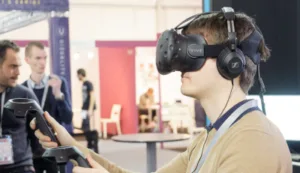An article by Science 2.0 (http://tinyurl.com/zofpwud) describes a university study that looked at how to improve the optical performance of VR headsets. The study was a combined effort between Stanford and Dartmouth University and will be presented at the ACM Conference on Human Factors in Computing Systems in May.
The electrical engineering group at Stanford prepared an Oculus Rift VR headset by adding focus tunable liquid lenses to the device. This allows content to be presented to the user with an adaptive focal length, which makes for a more comfortable viewing experience. The problem of conflicting depth cues was one of the stumbling blocks of 3D TV. This technology with variable focal length optics could overcome such issues.
The other partner in this research is Dartmouth’s Department of Psychological and Brain Sciences which points to other, simpler solutions like the use of monovision, as a potential way to improve the acceptability of VR headsets. Monovision is a technique used in ophthalmology to correct peoples’ vision in both directions (near and far sided) at the same time by providing one eye with a lens correcting for short sightedness and the other for far sightedness. According to the research, both methods, monovision and tunable liquid lenses, seem to improve the user’s acceptance of the VR device. -NH

